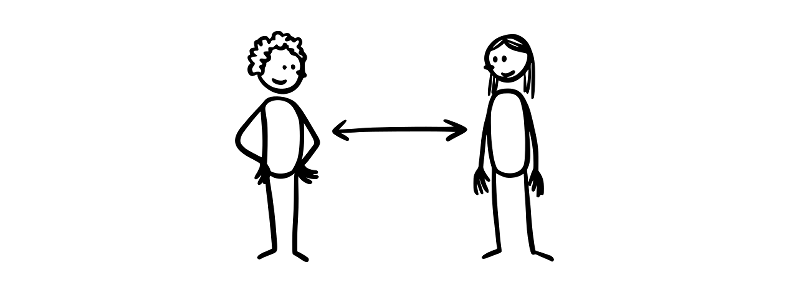Grammar Point:
The way to express comparisons in Chinese is by using 比 bǐ. However, when expressing “as same as,” there’s no need to use 比 bǐ anymore. Instead, we use 跟 gēn or 和 hé.
Structure 1
A + 跟 or 和 + B + 一样 or 相同
When you want to state that two things are the same, you should use this structure and avoid using the 比 bǐ structure.
跟 gēn and 和 hé both mean ‘and’ in English, and are considered colloquial language.
一样 yíyàng and 相同 xiāngtóng both mean ‘the same’ in English, but 相同 xiāngtóng is more formal than 一样 yíyàng.
這個字的意思跟那個字一樣嗎?这个字的意思跟那个字一样吗?
Is the meaning of this word the same as that word?
我對他的看法跟你一樣我对他的看法跟你一样
I have the same opinion about him as you do.
我跟我兩個朋友的名字相同,因為我們都是菜市場名字我跟我两个朋友的名字相同,因为我们都是菜市场名字
My name is the same as my two friends because we all have common names.
FYI
菜市场名字 càishìchǎng míngzi
The term ‘supermarket name’ refers to names that are commonly heard in the marketplace, and is used to describe very common names. When you call out one of these names in a supermarket, it’s likely that one or two people will answer you because they have the same name.
他的眼睛和他爸爸相同他的眼睛和他爸爸相同
He has the same eyes as his father.
我比他一樣高我比他一样高 ❌
I’m as tall as he is.
To negate 一样 yíyàng, just add 不 bù in front of it. However, if you want to negate 相同 xiāngtóng, it’s better to use the word 不同 bùtóng instead of 不相同 bù xiāngtóng.
我跟我姐姐的個性不一樣我跟我姐姐的个性不一样
My sister and I have different personalities.
你跟我的想法不同,但是想法沒有好壞,只是不同你跟我的想法不同,但是想法没有好坏,只是不同
Your idea is different from mine, but there is no right or wrong idea, just different.
這道菜和昨天那道不一樣,這道是四川菜这道菜和昨天那道不一样,这道是四川菜
This dish is different from the one yesterday, this is a Sichuan dish.
他的中文老師和我的不同,我的比較好他的中文老师和我的不同,我的比较好
His Chinese teacher is different from mine, mine is better.
我的狗跟你的狗不相同我的狗跟你的狗不相同 ❌
My dog is not the same as your dog.
(Actually, this sentence is not necessarily wrong, but it is not commonly used by native speakers. Some textbooks advise against using “不相同 bù xiāngtóng,” which is why I mentioned it here. However, in my personal opinion, it is still okay to use it.)
A + 跟 or 和 + B + 一样 + Adj.
This gives more details, compare with the above one.
你爸爸跟你一樣幽默嗎?你爸爸跟你一样幽默吗?
Is your father as funny as you?
你的國家跟台灣一樣小嗎?你的国家跟台湾一样小吗?
Is your country as small as Taiwan?
這道菜和昨天的菜一樣辣,你能不能做不辣的菜?这道菜和昨天的菜一样辣,你能不能做不辣的菜?
This dish is as spicy as yesterday’s dish. Can you make a non-spicy dish?
你寫的中國字跟畢卡索的畫一樣美你写的中国字跟毕卡索的画一样美
Your Chinese characters are as beautiful as Picasso’s paintings.
To negate this structure, you need to place the negation word in front of 跟 gēn instead of verbs.
我的中文沒跟他一樣好嗎?我的中文没跟他一样好吗?
Is my Chinese not as good as his?
他的薪水沒跟我一樣低吧?他的薪水没跟我一样低吧?
His salary is not as low as mine, right?
Practice
Learning English is as difficult for me as learning Chinese is for you.
我学英文和你学中文一样难
Wǒ xué yīngwén hé nǐ xué zhōngwén yíyàng nán.
Do you think the same as me?
你的想法和我一样吗?
Nǐ de xiǎngfǎ hé wǒ yíyàng ma?
If you think differently from me, then please don’t tell me what you think.
如果你跟我的想法不同,那请不要告诉我你的想法
Rúguǒ nǐ gēn wǒ de xiǎngfǎ bùtóng, nà qǐng bùyào gàosu wǒ nǐ de xiǎngfǎ.
- Basic Comparisons (HSK 1)
- Advanced Comparisons 1 跟…相比 (HSK5)


